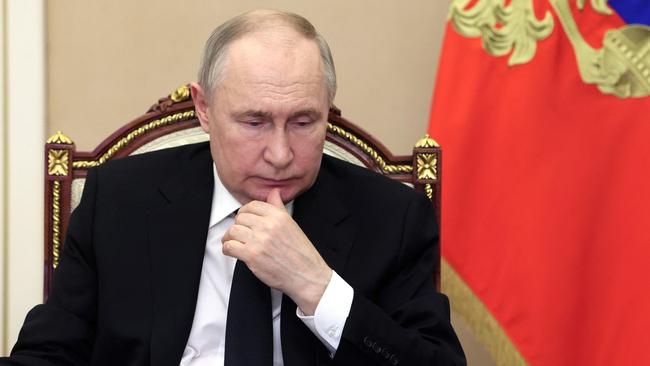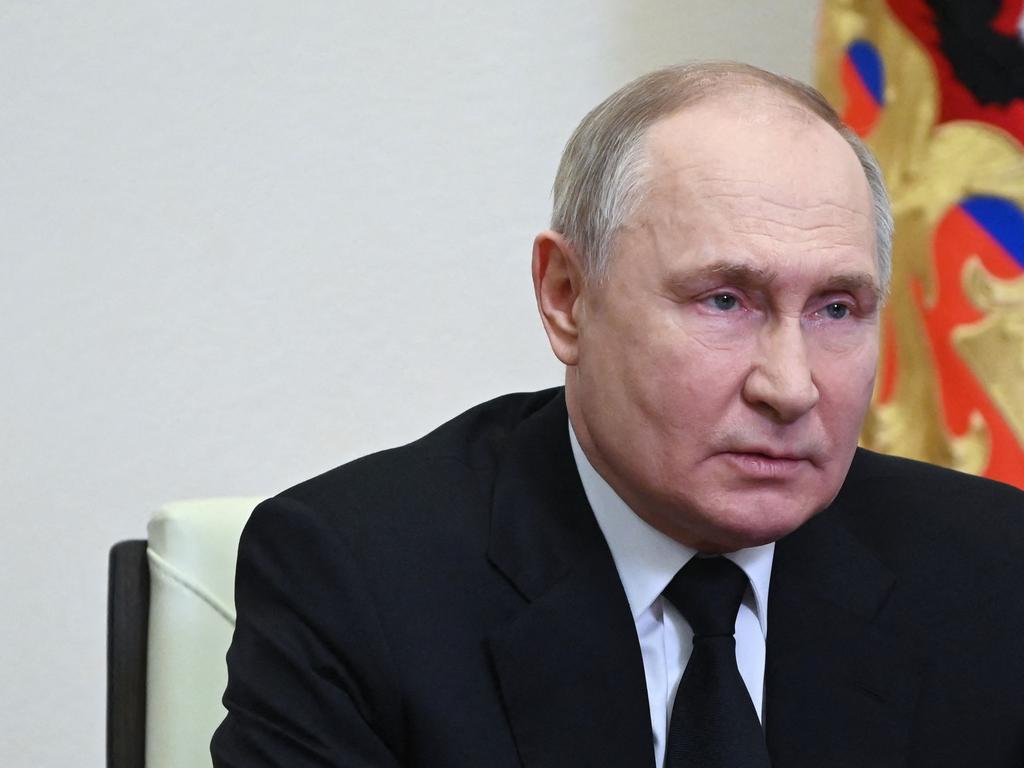‘Who’s the mastermind?’ Vladimir Putin refuses to blame Islamic State over Crocus Hall attack
Vladimir Putin acknowledged the Crocus City Hall attack was carried out by Islamic extremists but continues to claim a link to Ukraine and the US.

Vladimir Putin has acknowledged the Crocus City Hall attack was carried out by Islamic extremists but has refused to blame the Islamic State (IS), instead insinuating a link to Ukraine in a possible bid to limit the responsibility of the Russian security services.
IS claimed the attack Friday evening local time on the Crocus City Hall concert venue on the outskirts of Moscow that left at least 137 people dead, with Western governments also saying the extremist group appeared to be responsible.
In his latest comments on the attack, the Russian President acknowledged that “radical Islamists” had carried out the attack but said the attack “can only be a link for those who have been fighting us with the hands of the Kyiv regime since 2014.”
“The US … is trying to convince its satellites that there is not a Kyiv trace in the act of terror and that members of ISIS carried out the attack,” Putin told a security meeting.
“We know who carried out the attack. We want to know who the mastermind was,” he said, repeating the allegation that the perpetrators tried to flee to Ukraine after the attack.
“The goal is to show that all is not lost for the Kyiv regime,” he said, adding: “We need to fight to the last Ukrainian.”
Kyiv has already vehemently denied any involvement in the attack, with President Volodymyr Zelensky saying Putin was always seeking to blame “someone else”.
French President Emmanuel Macron on Monday warned Moscow against any “exploitation” of the attack, saying it would be “cynical and counter-productive for Russia to use this context to try and turn it against Ukraine”.
He said it was a branch of Islamic State that “planned the attack and carried it out”, adding this outfit had also plotted attacks in France.
In early March the US had warned Russia of a risk of an attack, a message Moscow appears to have batted away.
The London Times reports that a Russian disinformation campaign is attempting to pin the blame on Britain, Ukraine and the United States by publishing fake articles that purport to be from western media outlets.
One of the articles circulated by the Kremlin-run Doppelganger bot network was designed to look as if it had been written by Der Spiegel, the German magazine, according to The Insider, a Russian opposition website.
The fake article claimed that the attack was “clearly” organised by “Ukrainians who are trying to destabilise Russia after their military failures”. It also called on the German government to condemn Kyiv over the attack. No such article was published by Der Spiegel.
An Italian-language website run by Russia but designed to look like an authentic news outlet claims; “Ukraine has become a global centre for recruitment and training of terrorist cells by the United States and Great Britain.”
The attack came as Russia scents it has the upper hand on the battlefield over two years into the war but with the Kremlin still wary of ordering a new military mobilisation.
Tatiana Stanovaya, founder of R.Politik consultancy, described Putin’s link to Ukraine as “cautious”, arguing that if there had been any evidence of such a role reactions would have been even more explicit.
“The IS is testing a new tactic that involves newcomers who had not been flagged as extremists in police databases and that implies a much shorter period of preparation,” she told AFP.

But many commentators on pro-Kremlin media were in no doubt where to lay the blame.
“We are not talking about ISIS here. It was the khokhly,” said the editor-in-chief of the RT channel Margarita Simonyan, using a term used pejoratively in Russia to denote Ukrainians.
Mass-circulation newspaper Komsomolskaya Pravda quoted one commentator as blaming the “British special services and the Americans and Ukrainians” for the attack.
After Putin’s latest comments, Stanovaya wrote on Telegram that it appeared Putin was carefully using the conditional in his language and “does not yet have evidence of the involvement of either the US or Ukraine.”
“But he is convinced they would benefit from such an act of terror,” she wrote
– ‘Security lapses’ –
Meanwhile, the failure to avert the attack – in particular after possible intelligence from Moscow’s adversary the US – could be seen in some quarters as a major failure for the Russian security services.
Ex-agent Putin has sought to portray the KGB successor the Federal Security Service (FSB), which he himself used to head, as all powerful and able to protect Russians from threats to their homeland.
After the hostage massacre at a Moscow theatre showing the Nord-Ost musical in 2002 and the Beslan school siege in 2004, the Crocus City Hall is the latest atrocity claimed by jihadists under Putin that has put the role of security forces under the microscope.
While jihadists carried out a string of previous attacks, Putin will be mindful of the risk of disrupting Russia’s delicate society which includes more than 20 million Muslims.
Admitting that the attack was committed by IS would be to acknowledge that the image of a secure and stable Russia “where the state is omnipotent and the all-powerful security services control everything is a myth,” said Tatiana Kastoueva-Jean, Russia specialist at the French Institute of International Relations (IFRI).
She said that Putin’s priority is to divert attention from “security lapses” and rally “all those who are still hesitating on the domestic scene” to the need to fight the West and Ukraine.







To join the conversation, please log in. Don't have an account? Register
Join the conversation, you are commenting as Logout